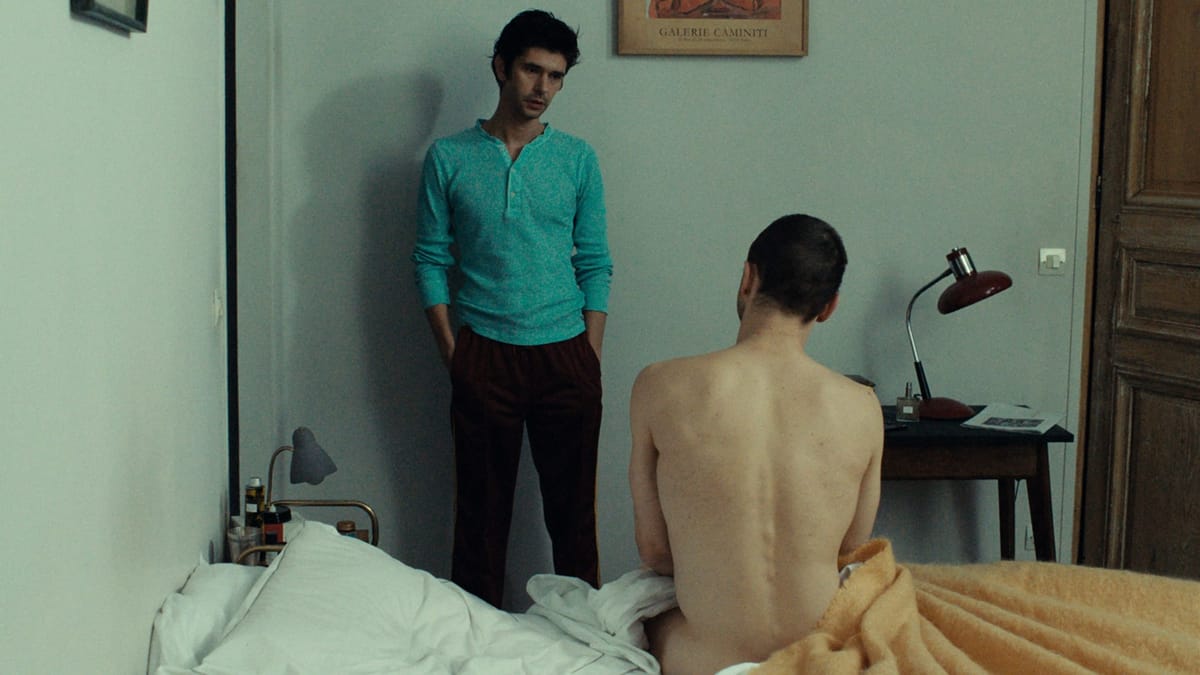Passages
It's crazy that a movie which lacks full frontal nudity (and violence) was rated NC-17.

At the wrap party for his latest film, Tomas (Franz Rogowski) meets Agathe (Adèle Exarchopoulos). They dance, they talk, and they end the evening by falling into bed together. In the morning, Tomas returns home to his husband Martin (Ben Whishaw), setting up the expected central conflict of the film. But writer/director Ira Sachs isn’t interested in jealousy or infidelity’s impact on the relationship, per se. Rather, he wishes to explore it as a symptom of the deeper issues between them, to understand what it says about Tomas and where he’s at in all parts of his life, and to watch as two adults attempt to navigate this messy issue together.
So, upon returning home, Tomas begins to share his experience with Martin, explaining he hasn’t felt like this in a very long time. Martin tolerates it for a bit before storming off, with Tomas chasing him and accusing Martin of hating him, eventually pulling down a suitcase as if to leave. Here again, Sachs lets you think you’ve found the thrust of the film, that it opens by us watching a marriage fall apart in an instant, with the implication of past wrongs hanging over it. That only lasts a moment before the true purpose of this whole sequence reveals itself.
Martin stays so level-headed, so calm, only getting slightly agitated and pushing Tomas’ suitcase away. Even that is intended to delay the confrontation, as he’s about to head out. Martin demonstrates an incredibly strong aversion to conflict, and a desire to just silently accept everything and insist it’ll be okay. So much so that Tomas feels like the relationship is lifeless and dead, and seems to in part be trying to get a rise out of Martin, acting out to antagonize in the same way a neglected child might.
This is their relationship, which brings so much before and after into sharp relief. Why Tomas is so quick to cheat on his husband, how the idea of sleeping with a woman appeals to him (we’re unsure if he’s done so before), and why his decision making is so rash. He’s erratic, almost chaotic, seeming to mash the buttons of his life at random, performing huge gestures but soon after losing interest. Ironically, before they end up separating for the first time, Martin befriends a novelist named Amad (Erwan Kepoa Falé) and Tomas reacts with extreme jealousy, as if to say “See? This is how defensive of our relationship I wish you’d be.”
Thus, Tomas finds himself stuck in a loop, both in his life and his emotional state. He thrives on intense and fiery emotions, so as soon as any part of his life reaches a steady state, he needs to do something to stir the pot. Maybe it’s traveling to their country house for a change of scenery, maybe it’s leaving to spend time with Agathe, maybe it’s just going for a long bike ride. But invariably, this animation exhausts those close to him, causing them to cease engaging, and triggering Tomas to seek conflict.
The movie unfolds as the portrait of multiple complicated and imperfect relationships as viewed through the lens of Tomas, who’s in the process of completely losing his sense of self. It features some of the most intense and passionate scenes of love and sex I’ve seen in film, not for their explicit nature but simply for the voracity with which two people demonstrate a need for each other, despite their best judgement.
Which is why it’s so fascinating that these characters really fail to grab me. I find myself watching but not invested in them. In part, it’s because so many of their interactions are so intense, leaving little space for the mundanity of every day life that we see in comparable movies, like those of Mia Hansen-Løve. The effect is that the movie feels like it wants to be more eventful, even as its mostly centered on conversations.
This also results in a self-importance that gets grating after a spell. The way that characters so often pause for a few seconds after saying something and before responding causes every single beat to scream “I’m important!”, which quickly dulls into none of them leaving a strong impact. This extends to physical choices, too, such as a scene when Tomas drops his lover off at the train station, and has an incredibly delayed reaction to them huffing out of the car. The repetition seems intended to inform us that all the characters are acting incredibly deliberately and thoughtfully in an attempt to execute their intricate dance properly, but given that it also extends to moments of heightening emotions, it ends up keeping us at a distance from them instead.
So while I appreciate the unique story and structure and characters, it’s not enough. While I tend to appreciate the time and space given to moments for them to breathe, this movie demonstrates the limits of that strategy, or at least how it can be pushed so far as to fall apart. Don’t mistake this for me calling it a bad movie: it’s still fascinating and nuanced, the type of messy adult drama I value so highly. It’s just an example of an attempt which rises up, but can’t quite kick into the next gear to really be something special.